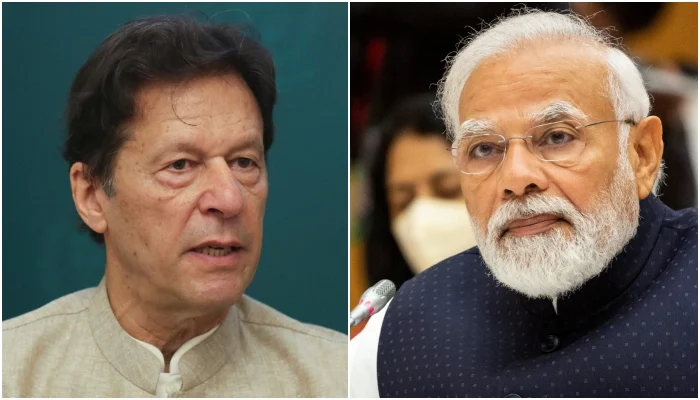LAHORE: According to Indian media quoting the memoirs of a former high commissioner to Pakistan, former prime minister Imran Khan called Indian Prime Minister Narendra Modi in a panic at midnight on February 27, 2019, in response to the Balakot airstrikes, in an attempt to prevent a military conflict.
Ajay Bisaria writes in his soon-to-be published book, The Anger Management: The Troubled Diplomatic Relationship between India and Pakistan, that Pakistan was afraid of an impending Indian attack on the evening of February 27, one day following the Indian Air Force’s airstrike on Balakot.
During a duel that resulted in the downing of two Indian jets and the capture of Indian pilot Abhinandan, Pakistani aircraft responded to an airstrike carried out by India on February 26 in Balakot.
Bisaria claims that Tehmina Janjua, the foreign secretary of Pakistan at the time, received a telegram from the army indicating that nine Indian missiles were aimed at Pakistan and could be launched at any moment throughout the day.
According to Bisaria, the foreign secretary asked foreign envoys to inform their capitals of this intelligence and recommend that India refrain from exacerbating the situation. Imran Khan made a bold move as the crisis worsened, asking for a midnight phone call with Prime Minister Modi in order to seek immediate talks to ease the mounting tension. According to reports, Sohail Mahmood, the Pakistani High Commissioner at the time, set up the call by getting in touch with his counterpart in Delhi.
“I received a call at midnight in Delhi from Sohail Mahmood, the Pakistani High Commissioner, who is now in Islamabad. He informed me that Prime Minister Imran Khan was eager to speak with Prime Minister Modi. After checking upstairs, I replied that Imran Khan may, of course, contact me if he has any urgent messages to deliver, but our prime minister was not available at that hour. In his book, Bisaria states, “I didn’t get a call back that evening.
Not to be outdone, even China proposed sending a deputy minister to both nations in an attempt to defuse the situation. India has graciously turned down the invitation, he recalls.
According to Bisaria, “one of them suggested to her that Pakistan should communicate its concerns directly to India.”
According to Bisaria, “the pilot would be flown back to India the next day, and the announcements would be made by Pakistan’s PM personally. According to him, India’s “coercive diplomacy” was successful because it set clear expectations for Pakistan and the rest of the world and was backed by a convincing determination to escalate the situation.
“In a subsequent campaign speech, Prime Minister Modi stated, ‘Thank goodness, Pakistan declared that the pilot would be returned to India.'” It would have been “qatal ki” otherwise.
Regarding the broader geopolitics of the region, Bisaria reports that Chinese President Xi Jinping “declared that China would not be propping up Pakistan against India,” in response to Pakistan Prime Minister Imran Khan’s message to Beijing that Beijing should back Islamabad because the US had chosen to arm India against China.
According to what I’ve learned, Khan advised the Chinese to back Pakistan because the US had chosen to back India against China. According to him, President Xi Jinping chastised Imran Khan for his oversimplified geopolitical analysis and said that China would not support Pakistan in any conflict with India.
“He had counseled Khan that Pakistan should reconcile with India since the US might assist Pakistan in their ties with that country.
According to Bisaria, Pakistan was “ready to de-escalate the situation, act on India’s dossier, and to seriously address the issue of terrorism” when the US and UK envoys in Delhi informed India’s foreign secretary later that evening.
Imran Khan gave a press conference the following day and declared that the pilot would be released. Although Imran Khan referred to Varthaman’s release as a “peace gesture,” Bisaria points out that India’s coercive diplomacy was the reason behind this.
The Agra Summit collapsed in 2001 due to Pakistan’s then-president Pervez Musharraf’s “overreach” in publicly expressing his hawkish views on Kashmir, his lack of intention to contain terrorism, and his insistence on a formulation linking progress on Kashmir to forward movement in overall ties.
According to Bisaria, the Indian High Commissioner in Islamabad received a warning from Pakistan’s spy agency, ISI, about an al-Qaeda conspiracy to strike Kashmir in June 2019. The tip turned out to be accurate.
Since the Balkot incident, Pakistan has insisted that it return the Indian pilot as a gesture of goodwill. On February 28, then-prime minister Imran Khan addressed the National Assembly of Pakistan and declared, “As a peace gesture, we are releasing the Indian pilot tomorrow (March 1).”







